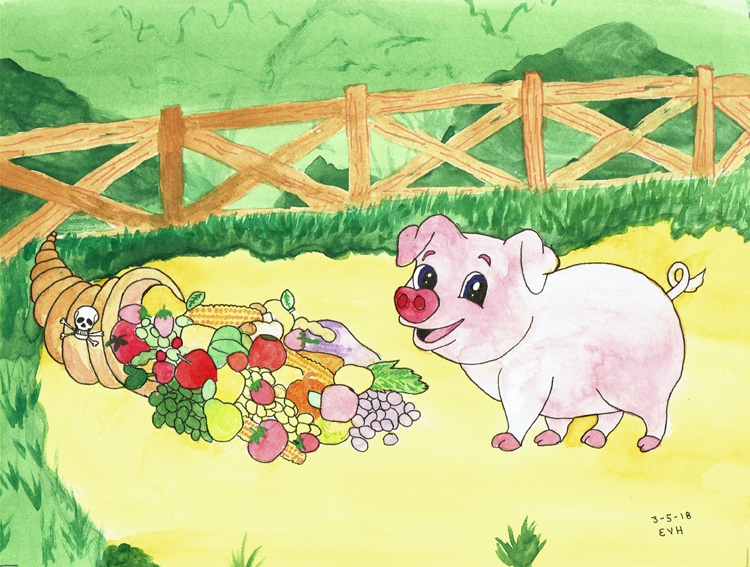
Jataka 30
Muṇika Jātaka
The Ox Who Envied the Pig
as told by Eric Van Horn
originally translated by Robert Chalmers, B.A., of Oriel College, Oxford University
originally edited by Professor Edward Byles Cowell, Cambridge University
This story might also be called, “Be careful what you wish for!”
You may notice that the Buddha’s attendant, Ānanda, shows up in many of these stories, and not always in the most flattering way. There was a lot of jealousy of Ānanda in the Saṇgha because he was so close to the Buddha, and he controlled access to the Buddha. Ānanda was also, according to the Pāli texts, most responsible for getting the Buddha to ordain women. This was very unpopular among the monks. So in the Jātaka literature, presumably this is why he shows up so often as the story’s foil.
“Do not envy poor Muṇika.” This story was told by the Master while at Jetavana. It is about a monk who was being seduced by a plump young woman, as will be related in the Thirteenth Book in the Culla Nārada Kassapa Jātaka (Jātaka 477).
The Master asked the monk, “Is it true, brother, as they say, that you are being tempted by a young woman?”
“It is true, sir,” he replied.
“Brother,” the Master said, “she is your ruination. Even in bygone days, you met your end and were made into a feast for the guests on her wedding day.” And so saying, he told this story of the past.
Once upon a time, when Brahmadatta was reigning in Benares, the Bodhisatta was born as an ox named Big Red. He lived on a wealthy man’s estate in a certain town. He had a younger brother who was known as Little Red. They were the only two oxen on the estate to do all the work for the family.
The wealthy man had an only daughter. A gentleman of the town asked for her hand in marriage for his son. The wealthy man and his wife agreed to the match. And they wanted to provide the finest food for the wedding guests, so they began to fatten up a pig named Muṇika.
When Little Red saw this he said to his brother, “You and I have to do all of the heavy work for this household, but all they give us for our pains is sorry grass and straw to eat. Yet here is the pig being fed on fine rice! Why does he deserve to get such good food?”
His brother said, “My dear Little Red, do not be jealous of him, for the pig eats the food of death. He is being fattened to provide a feast for the guests at their daughter’s wedding. The guests will be coming any day now. Then you will see that pig pulled out of his pen by the legs, killed, and converted into curry!” And so saying, he repeated this verse:
Do not envy poor Muṇika. It is death
He eats. Be contented with your frugal fare.
It is the guarantee of many days to come.

Figure: Beware of farmers bearing gifts!
Soon afterwards the guests did arrive, and Muṇika was killed and cooked into all manner of dishes. The Bodhisatta said to Little Red, “Did you see Muṇika, dear brother?”
“I did indeed, brother, see the outcome of Muṇika’s feasting. It is better to have a hundred, even a thousand, times worse food than we have, even if it is just grass, straw, and trash. For our food does not lead to harm, and it guarantees that our lives will not be cut short!”
When he ended his lesson about how the monk had been brought to his doom by that young woman and had been made into a feast for the wedding guests, he taught the Four Noble Truths. After he finished, the tempted monk attained the first stage of awakening, stream-entry. The Master then showed the connection and identified the birth by saying, “The tempted monk was the pig Muṇika of those days. The young woman is the same in both cases. Ānanda was Little Red, and I myself Big Red.”
